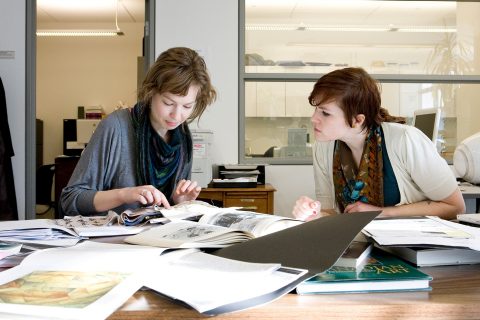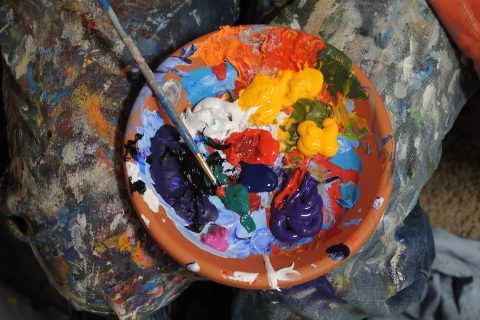Art Education – Visual Arts (BFA)
Why study Art Education?
Art educators help students of all ages appreciate and create visual art in classrooms and community centres. As a student artist, you’ll choose from a comprehensive list of artistic disciplines and find faculty to foster your talent no matter what your interests. Our media labs and production studios, amongst the best in Canada, give you the tools to realize your vision.
As a student teacher, you’ll have internships in community art programs and schools. Then, halfway through your degree, you can apply to the specialization program that leads to provincial certification.
Through our holistic approach, attending small classes, receiving lots of personal attention, you’ll grow as a person, educator and artist. With solid training in artistic and teaching practices, you’ll be well-equipped to do everything from planning high school classes to developing community art programs, even developing effective and educational visits to fine arts museums. You’ll have a strong grounding in your own artistic practice, too, thanks to broad-based and intensive study.
Program highlights
- Contribute to or help produce a student-run research-creation journal, InArte
- Develop your expertise and experience as an artist, researcher and educator in one program
Special funding for out-of-province students
Up to $4000 for undergraduate programs.
Program structure
A Bachelor of Fine Arts degree takes a minimum of three or four years (90 – 120 credits) of full-time study, depending on your academic background.
Program options
- Specialization in Art Education – Visual Arts (120 credits)*
- Major in Art Education – Visual Arts (66 credits)
- Minor in Art Education – Visual Arts (24 credits)
*Admission is to the major. After the completion of 60 credits in the Major in Art Education – Visual Arts program, if in-school art teaching interests you, then you may apply to transfer to the Specialization in Art Education – Visual Arts program.
As a graduate of the specialization program, you are eligible for teacher’s certification from the Ministère de l'Enseignement supérieur (MES). However, you must satisfy the English language proficiency requirements of the program to be recommended to the Quebec Teachers Certification Service for a Quebec permanent teaching diploma.
Courses
Admission criteria
This program is available for Fall admission only.
Minimum cut-off averages and course requirements
- Quebec CEGEP: DEC
- High School: C+
- ACT or SAT is NOT required
- Canadian curricula course requirements
- Accepted international qualifications
- International Baccalaureate (IB) diploma: 26
- International Baccalaureate Career-related Programme (CP): 26
- Baccalauréat français: 11
- British system of education (GCE):
- A-levels: At least two A-level exams CD or
- AS-levels: At least 4 AS-level exams with equivalent results or
- BTEC: Level 3 Diploma or Extended Diploma in a related subject area with equivalent results
- Additional information for British System of Education (GCE) applicants
- University Transfers (internal/external): C
Additional requirements for admission
Applicants must submit additional requirements for admission directly to the department.
- Letter of intent
- Portfolio
Minimum cut-off averages should be used as indicators. The cut-off data may change depending on the applicant pool. Applicants who meet the stated minimum requirements are not guaranteed admission to these programs.
Application deadlines
It’s not too late to apply
Most undergraduate programs are still accepting applications for fall 2025.

FALL ENTRY (September)
Deadline: March 1
International applicants: Apply no later than February 1 to allow time for immigration document processing. However, applying earlier is strongly recommended. Immigration processing times vary by country, and delays could prevent you from starting your studies on time.

WINTER ENTRY (January)
Admission to this program is available for the Fall Term only.
We reserve the right to close admission to a program at any time after the official deadline without prior notice.
Funding note
Quebec residents who enroll in certain programs and meet the eligibility criteria may apply for funding of $2,500 per term through the Quebec Perspective Bursary (Bourse Perspective Quebec).
United States students: A U.S. Federal Student Aid-eligible version of this program is offered. This version meets all U.S. regulations (such as no co-operative education or e-courses) for eligible programs.
After your degree
A solid combination of art education and art practice will open up many careers paths for you, including:
- High school and elementary school art teachers
- Art museum and gallery educators
- Instructors and program directors in community art programs: working with at-risk youth, elderly adults, women’s shelters, hospitals, and long-term care facilities
- Self-employed artist-teachers
Combined undergraduate study in Art Education and Psychology can be the basis for admission to graduate professional programs in Creative Arts Therapies.
Student story

Haley Kuchar
Specialization in Art Education – Visual Arts
Minor in langue française
I’m from out of province and came to Montreal with basic French skills. Going to Concordia was a great opportunity to improve my French and learn about the language in a way that I was genuinely interested in.
Other programs of interest

In our flexible program within the Faculty of Fine Arts, you focus on artistic periods that interest you. You perform academic research, learning to write formally and extensively about art.
Department
Faculty

The Major in Art History and Studio Art is the ideal choice for someone interested in both the study and practice of art. Perform academic research and learn to write formally about art as you focus on periods that interest you, from ancient Greece to contemporary art and architecture.
Department
Faculty

As a Studio Art major, you’ll have the flexibility to choose a concentration or combine any of our seven disciplines: Ceramics, Fibres and Material Practices, Intermedia/Cyberarts (Performance, Video, Electronic Arts), Painting and Drawing, Photography, Print Media, Sculpture and Installation.
Department
Faculty


